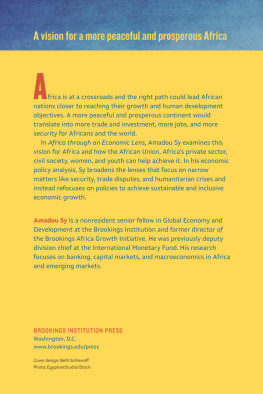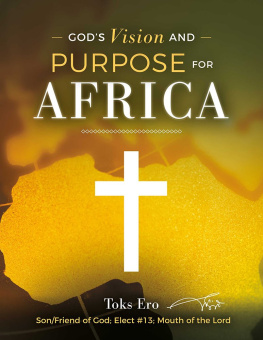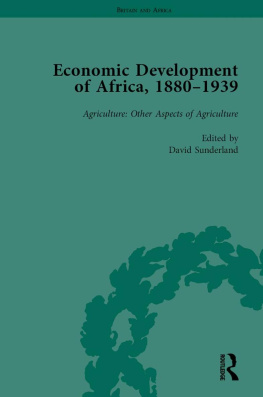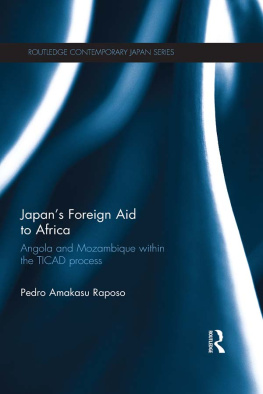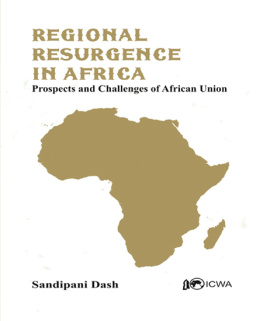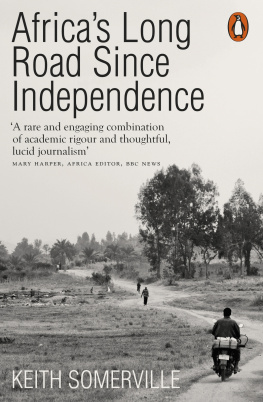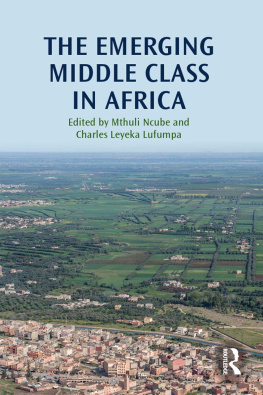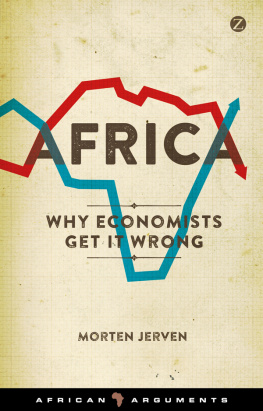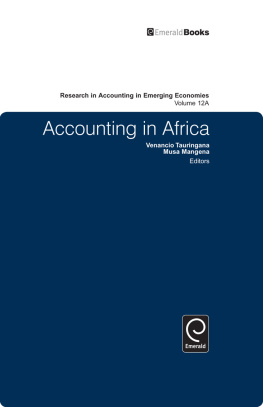AFRICA
THROUGH AN
ECONOMIC LENS
Amadou Sy
BROOKINGS INSTITUTION PRESS
Washington, D.C.
Copyright 2018
THE BROOKINGS INSTITUTION
1775 Massachusetts Avenue, N.W., Washington, D.C. 20036
www.brookings.edu
All rights reserved. No part of this publication may be reproduced or transmitted in any form or by any means without permission in writing from the Brookings Institution Press.
The Brookings Institution is a private nonprofit organization devoted to research, education, and publication on important issues of domestic and foreign policy. Its principal purpose is to bring the highest quality independent research and analysis to bear on current and emerging policy problems. Interpretations or conclusions in Brookings publications should be understood to be solely those of the authors.
Library of Congress Cataloging-in-Publication data are available.
ISBN 978-0-8157-3473-4 (pbk. : alk. paper)
ISBN 978-0-8157-3474-1 (ebook)
9 8 7 6 5 4 3 2 1
Typeset in Sabon
Composition by Westchester Publishing Services
CONTENTS
PREFACE
This book draws on my experience as director at the Africa Growth Initiative (AGI), a part of the Global Economy and Development (GED) division at the Brookings Institution. Through conferences, seminars, meetings, blog posts, papers, briefings, and editorial comment, AGI scholars examine the problems of the countries of Africa and seek to encourage policies that could lead to sustainable and inclusive growth on the continent. The scholars think ahead, focusing on broad issues of importance to Africa rather than simply reacting to a specific crisis.
When I joined Brookings in 2013, the GEDs outstanding communications team was led by Mao-Lin Shen, who encouraged me to write weekly blogs on African issues. I was thrilled by the opportunity to finally have an open platform to test my ideas and help push the African agenda in Washington, D.C.
After more than three years of writing on African issues, I could see that the weekly blogs were telling a narrative that needed to be heard more widely if it was to affect Africas future. The writings used a lens that is often overlooked when thinking about Africa: the economic lens. For instance, when the U.S. media focused on the Ebola outbreak, I felt that learning about the economic impact of the crisis would help all stakeholders.
As I prepared to move on from my directorship of AGI (I am now a nonresident senior fellow there), Kemal Dervi, vice president of GED, urged me to write a book about the continent. I revisited the blogs, conference proceedings, and working papers I had worked on during my time at Brookings (these are all available on the institutions web pagewww.brookings.edu/project/africa-growth-initiative/and I am thrilled to see that the conversation continues with a new and dynamic team at GED). Africa through an Economic Lens is the result of that exercise, with the addition of new writing about how Africa can move forward in the future.
I am particularly grateful to Christina Golubski and Zenia Lewis for editing and helping me organize the background material for this book, as well as Rabah Arezki for reviewing it. I would also like to thank Brahima Coulibaly and the late Mwengi Kimenyi, the current and former directors of AGI, as well as my former colleagues thereOmid Abrishamchian, Bryce Campbell, Amy Copley, Temesgen Deressa, Armand Dieng, Otito Greg-Obi, Aki Nemoto, Jessica Pugliese, Kristina Server, Jacqueline Sharkey, Eyerusalem Siba, Mariama Sow, Tor Syvrud, Valeriya Ten, and Andrew Westburyfor their collaboration. I learned a lot from many experts, but I could always count on my colleagues at GEDdirector Homi Kharas, Amar Bhattacharya, Laurence Chandy, Soumya Chattopadhyay, Karim Foda, Jeffrey Gutman, Joshua Meltzer, Eswar Prasad, Ernesto Talvi, Guillermo Vuletin, and Rebecca Winthropto help me test and refine my ideas. Thank you to William Finan and Janet Walker at Brookings Institution Press, and to John Donohue at Westchester Publishing Services. Last but not least, I dedicate this book to my late father, Dr. Amadou Yoro Sy, who passed away in 2017, and to my family for their unconditional support.
Introduction: A Vision for Africa
Policymakers and political commentators in the United States typically look at the continent of Africa in four ways, or through four lenses:
- Security experts focus on security risks and the strategy to combat terrorism and related risks in Africa, such as U.S. involvement in solving the crisis in Africas Great Lakes region, U.S. advisers assisting in the Sahel in the fight against Boko Haram and the Lords Resistance Army, or U.S. participation along the coast of Somalia and in the Gulf of Guinea in the fight against piracy.
- Humanitarian aid experts focus on addressing situations such as those in South Sudan and the Central African Republic and epidemics such as the Ebola virus that struck first in West Africa. Other types of aid experts look at ways to address longer-term issues, such as improving health and education.
- China experts focus on that countrys growing role in Africa and what it means for the United States.
- Oil and other natural resource specialists focus on exploration and exploitation of such assets.
Of course, all these issues are interdependent and have important consequences for growth and development.
Before joining the Africa Growth Initiative (AGI), I had spent the previous fifteen years working in Washington on issues related to banking, capital markets, and macroeconomics in Africa and other emerging markets. The experience has allowed me to understand in depth the different perceptions of Africa and ways the continents development is viewed. The breadth of issues facing Africa is quite large. At seminars, remarks from panelists and questions from the audience would trigger even more questions that I felt werent being answered.
The private sector makes most of the investments in information and communication technology on the continent, whereas governments focus more on transportation and energy. I, along with other AGI scholars, thought seriously about how the private sector could better achieve development objectives and partnerships with governments and other stakeholdersfor example, in filling Africas infrastructure gap. What will be the next wave of private sector investment now that almost every African has a cell phone? How can foreign direct investment that builds an offshore oil platformoil is an enclave sectorbenefit the country and its people beyond the expected oil revenues?
We examined how to get more and better financing for development in Africa. Within this theme, we looked at external financingprivate capital, official development assistance, and remittancesthat flowed to Africa during 19902012, how the relative role of each component has changed, and the opportunities and risks associated with each one. We also went beyond averages and focused on how policies should be different for different countries or groups of countries. For instance, the role of official development assistance has decreased in sub-Saharan Africa, but countries with fragile central governments are still heavily dependent on it. Foreign direct investment has increased a lot but most goes to resource-rich countries. I wrote extensively on financing infrastructure in Africa, examining the role of the private sector, official development financing, China, and African governments in funding major infrastructure projects. My colleagues and I also looked at reducing the infrastructure gap through efficiency gains, most of which can be attained through better governance.
We were also thinking of going one step deeper than the national level to assess the challenges that rapid urbanization will create in the Africa of tomorrow and how to address them. We considered how big data can play a role in circumventing existing challenges in the availability of reliable data to guide policy analysis. For instance, we used mobile phone usage data in Senegal to see how the opening of a toll highway is changing how people commute to work, and in particular how the toll highway is affecting subsections of the Dakar urban metropolitan area. We strived to better understand the growth traps and opportunities for Africas dominant economies (South Africa and Nigeria). In addition, our work examined the role of the United States as a central partner to African stakeholders, not only governments but also the private sector and civil society. Despite the wide variety of issues, the constant was that our economic approach complemented the different voices in the conversation about Africa in Washington.
Next page
